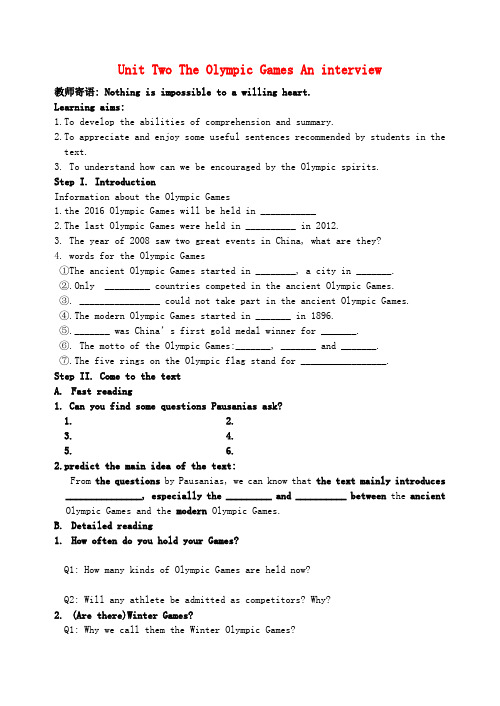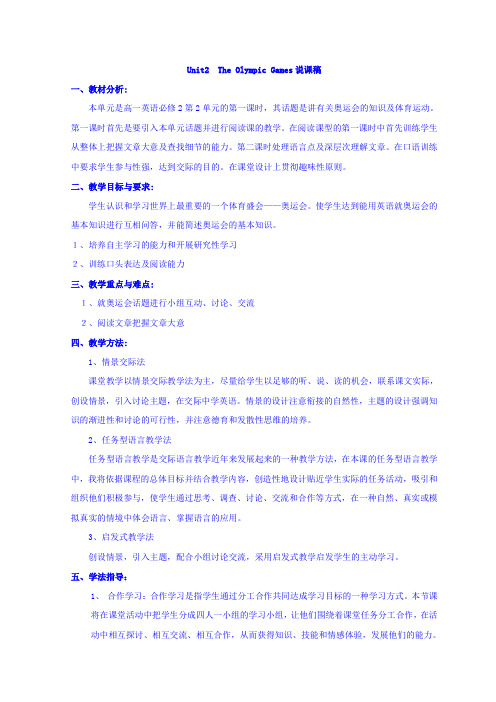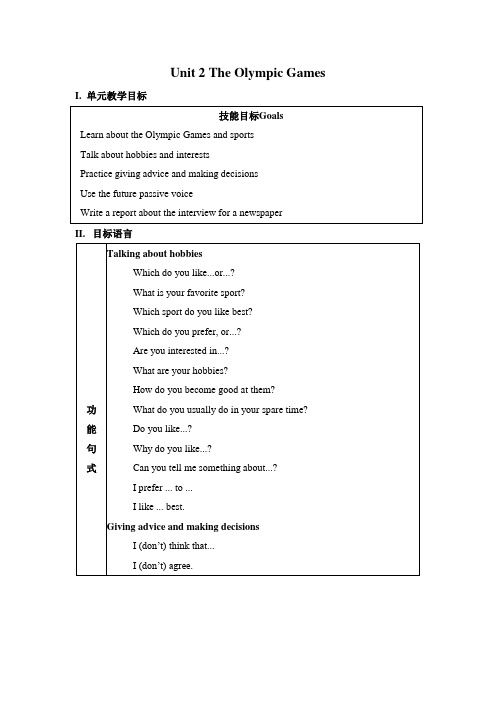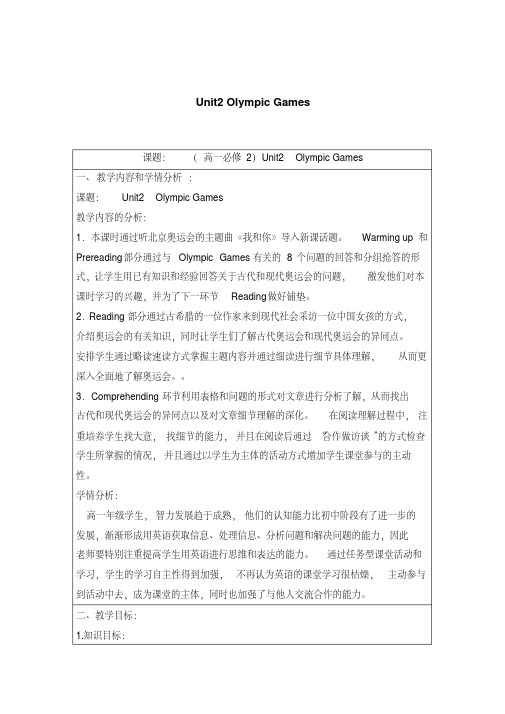(新人教版)高中Unit2TheOlympicGames2.1学案必修2(英语 解析版)
人教版高中英语必修知识2《Unit 2 The Olympic Games》教案

人教版高中英语必修知识2《Unit 2 TheOlympic Games》教案人教版高中英语必修学问2《Unit 2 The Olympic Games》教案在教学的设计中要充分为学而教,以学生如何有效猎取学问,提高能力的标准来设计教学。
其实在教学中,备课是一个必不行少,十分重要的环节,备学生,又要备教法。
备课不充分或者备得不好,会严峻影响课堂气氛和主动性。
下面和课件网一起看看有关人教版高中英语必修学问2《Unit 2 The Olympic Games》教案。
《Unit 2 The Olympic Games》教案1教学预备教学目标Teaching Aims:1.Get the Ss to talk about their hobbies and interests.2.Help the Ss write a composition3.let students realize how important the sports are4. useful expressionso My favorite sport is becauseo I like becauseo I became interested in it wheno My favorite athlete/footballer/sportsman iso I like him/her becauseo I practiseo In the future I hope to教学重难点Teaching Important Points:1.Get the Ss to talk about their hobbies and interests.2.Enable the students to write a compositionTeaching Difficult Points:1.How to talk about hobbies and interests.2.How to write a composition about their favourite sports.教学过程The General Idea of Th is Period:This period has two aimsto encourage the Ss to think and talk creatively about their hobbies and interests and to organize their ideas into a composition and to enable the students to write a report about their favou rit e sport.Teaching Aims:1.Get the Ss to talk about their hobbies and interests.2.Help the Ss write a composition3.let students realize how important the sports are4. useful expressionso My favorite sport is becauseo I like becauseo I became interested in it wheno My favorite athlete/footballer/sportsman iso I like him/her becauseo I practiseo In the future I hope toTeaching Important Points:1.Get the Ss to talk about their hobbies and interests.2.Enable the students to write a compositionTeaching Difficult Points:1.How to talk about hobbies and interests.2.How to write a composition about their favourite sports.Teaching Methods:1.Discussion in pairs and in groups.2.Practice.Teaching Aids:1.A multimedia computer.Teaching Procedures:Step 1 RevisionRead the words loudly and have a competitionStep2 lead inShow some picture in which the teacher is doing something she likes to arouse students interestStep3 pre-writingTask1:Making a Survey on Others Interests or HobbiesQ1:What is your favourite sport?S1:S2:S3:Q2:How you became interested in that sport:S1:S2:S3:Q4:What do you do to improve your skill?S1:S2:S3:Q5:Who is your favourite athlete? Why do you like him or her?S1:S2:S3:留意:1.划线部分的连接词是把不同的思想连接在一起。
高中英语 Unit2 The Olympic Games教案 新人教版必修2

Unit Two The Olympic Games An interview教师寄语: Nothing is impossible to a willing heart.Learning aims:1.To develop the abilities of comprehension and summary.2.To appreciate and enjoy some useful sentences recommended by students in the text.3. To understand how can we be encouraged by the Olympic spirits.Step I. IntroductionInformation about the Olympic Games1.the 2016 Olympic Games will be held in ___________2.The last Olympic Games were held in __________ in 2012.3. The year of 2008 saw two great events in China, what are they?4. words for the Olympic Games①The ancient Olympic Games started in ________, a city in _______.②.Only _________ countries competed in the ancient Olympic Games.③. ________________ could not take part in the ancient Olympic Games.④.The modern Olympic Games started in _______ in 1896.⑤._______ was China’s first gold medal winner for _______.⑥. The motto of the Olympic Games:_______, _______ and _______.⑦.The five rings on the Olympic flag stand for _________________.Step II. Come to the textA.Fast reading1. Can you find some questions Pausanias ask?1. 2.3. 4.5. 6.2.predict the main idea of the text:From the questions by Pausanias, we can know that the text mainly introduces _______________, especially the _________ and __________ between the ancient Olympic Games and the modern Olympic Games.B.Detailed reading1.How often do you hold your Games?Q1: How many kinds of Olympic Games are held now?Q2: Will any athlete be admitted as competitors? Why?2.(Are there)Winter Games?Q1: Why we call them the Winter Olympic Games?Q2: Which events do the Summer Olympics have?3. Do you mean the Greek world?ancient Olympic Games:Only _____ cities, no other countries could join in, norcould _______ or _______.modern Olympic Games: ________ country can take part if their athletes are goodenough. ________ are not only allowed, but play a veryimportant role in…4 .Where are all the athletes housed?__________________ to live in, a reception building, some stadiums, and a gym as well.5.Does anyone want to host the Olympic Games?①…a great_______________ but also a great honor to be chosen② There is __________ competition to host …_________ to win …6.Do you compete for prize money?It’s still about the ________of the Olympics “Swifter, Higher and stronger”1.I lived in what you call “ Ancient Greece”.①We are living in ______ we call “ information age”.②I once lived in ______ was called “Waste Land”.2. Only athletes who have reached the agreed standard for their events will be admitted as competitors.= Only when the athletes have reached the agreed standard for their events, _________________________competitors.2.There’s as much competition among countries to host the Olympic Games as to win Olympic medals. (译)______________________________________就跟争夺奥运奖牌一样的激烈。
高中英语 Unit2 The Olympic Games学案 新人教版必修2

Unit 2 The Olympic Games第一学时Reading and ComprehensionThe Olympic flagOn the Olympic flag,the rings appear on a white background(背景).Pierre de Coubertin,the father of the modern Olympic Games,explains the meaning of the flag:“The Olympic flag has a wh ite background,with five interlaced(交织的;交错的)rings in the centre:blue,yellow,black,green and red.This design is symbolic(象征的;象征性的);it represents(代表;象征) the five continents of the world,united by Olympism,while the six colors are those that appear on all the national flags of the world at the present time.”Combined in this way,the six colors of the flag,(including the white of the background)represent all nations.At the Olympic Games,the flag is brought into the stadium during the opening ceremony (开幕式).After its arrival,the flag is lifted up the flagpole.It must fly in the stadium during the whole of the Games.When the flag is lowered at the closing ceremony,it means the end of the Games.►Task 1仔细阅读课文“An Interview”,根据课文内容选出最佳答案。
人教版高中英语必修二教案:Unit2+The+Olympic+Games.doc

Unit2 The Olympic Games说课稿一、教材分析:本单元是高一英语必修2第2单元的第一课时,其话题是讲有关奥运会的知识及体育运动。
第一课时首先是要引入本单元话题并进行阅读课的教学。
在阅读课型的第一课时中首先训练学生从整体上把握文章大意及查找细节的能力。
第二课时处理语言点及深层次理解文章。
在口语训练中要求学生参与性强,达到交际的目的。
在课堂设计上贯彻趣味性原则。
二、教学目标与要求:学生认识和学习世界上最重要的一个体育盛会——奥运会。
使学生达到能用英语就奥运会的基本知识进行互相问答,并能简述奥运会的基本知识。
1、培养自主学习的能力和开展研究性学习2、训练口头表达及阅读能力三、教学重点与难点:1、就奥运会话题进行小组互动、讨论、交流2、阅读文章把握文章大意四、教学方法:1、情景交际法课堂教学以情景交际教学法为主,尽量给学生以足够的听、说、读的机会,联系课文实际,创设情景,引入讨论主题,在交际中学英语。
情景的设计注意衔接的自然性,主题的设计强调知识的渐进性和讨论的可行性,并注意德育和发散性思维的培养。
2、任务型语言教学法任务型语言教学是交际语言教学近年来发展起来的一种教学方法,在本课的任务型语言教学中,我将依据课程的总体目标并结合教学内容,创造性地设计贴近学生实际的任务活动,吸引和组织他们积极参与,使学生通过思考、调查、讨论、交流和合作等方式,在一种自然、真实或模拟真实的情境中体会语言、掌握语言的应用。
3、启发式教学法创设情景,引入主题,配合小组讨论交流,采用启发式教学启发学生的主动学习。
五、学法指导:1、合作学习:合作学习是指学生通过分工合作共同达成学习目标的一种学习方式。
本节课将在课堂活动中把学生分成四人一小组的学习小组,让他们围绕着课堂任务分工合作,在活动中相互探讨、相互交流、相互合作,从而获得知识、技能和情感体验,发展他们的能力。
2、创设情景和有意义的任务活动,激发学生的学习热情,指导学生自主学习,发挥他们自己的主观能动性,把被动的学习变为主动学习。
高中英语 Unit2 The Olympic Games教案1 新人教版必修2-新人教版高一必修2英

3.No other countries could join in ,nor could slaves or women!
4.Every four yearsathletes from all over the world are admitted as competitors.
课题
Unit 2 The Olympic Games ( reading )
班级
授课〔完成〕时间
教师〔学生〕
教学
目
标
知识与技能
掌握有关奥运会的词汇,以及文中出现的关于奥运会的句子。Take part in, medal, interview, admit, stadium, replace, as well,
教〔学〕后反思
Step Two: CarefulReading
Items
TheAncient Olympics
The ModernOlympics
Frequency
Every1.______years
Every2.______years
Types
Only Summer Olympic Games
Summer and3.________ Olympic Games
过程与方法
使学生能够用略读〔skimming〕,跳读〔scanning〕等阅读技巧快速准确地找出古代奥运会和现代奥运会的异同点。
情感态度
与价值观
通过本单元的学习使学生更多的关注奥运会,培养学生合作学习的能力以及团队精神。
重点
难点
1.教学重点:学生可以比较古代奥运会和现代奥运会的异同点,并且能学习更多的关于奥运会的知识。
(人教版)高中英语必修二Unit 2 The Olympic Games教案

Unit 2 The Olympic Games I. 单元教学目标II. 目标语言III. 教材分析和教材重组1. 教材分析本单元以Olympic Games 为话题,旨在通过本单元教学,使学生了解奥运会的起源、宗旨、古代奥运会与现代奥运会的区别和相似之处以及比赛项目。
同时培养学生对体育运动的爱好。
在口语表达中,要求学生学会询问别人的兴趣爱好,以及如何向别人推荐自己的某一种爱好。
1.1 Warming Up通过对关于Olympic Games 的8个问题的提问,让学生根据对奥运知识的了解回答问题,目的在于激活同学们所了解的奥运知识,激发学生学习本单元的兴趣。
1.2 Pre-Reading通过学生对三个问题的讨论与交流,使他们了解奥运会有关知识。
1.3 Reading通过古希腊的一位作家到现代社会采访一位中国女孩的方式,介绍奥运会的有关知识,也让学生们了解了古代奥运会和现代奥运会的异同。
1.4 Comprehending是利用表格和问题的形式对文章进行分析,要求同学们找出古代与现代奥运会的异同点以及对文章内容细节的理解。
1.5 Learning about Language分词汇和语法两部分。
第一部分Discovering useful words and expressions 中的第一个练习,根据课文的上下语境的理解词意,写出英文解释所对应的单词。
第二个练习是要求同学们通过熟悉的近义词或短语来掌握课文中出现的新的词和短语。
第三个练习则是一篇小短文,要求同学们用所给的单词的正确形式填空。
第二部分Discovering useful structures则通过3 个练习来巩固同学们对将来时态的被动语态使用。
1.6 Using Language分为Reading and Listening,Speaking and Writing两部分。
Reading “The story of Atlanta”是一篇古希腊的故事。
人教版英语必修二Unit2TheOlympicGames教案2

Unit2 Olympic Games课题:(高一必修2)Unit2 Olympic Games一、教学内容和学情分析:课题:Unit2 Olympic Games教学内容的分析:1.本课时通过听北京奥运会的主题曲《我和你》导入新课话题。
Warming up 和Prereading部分通过与Olympic Games 有关的8个问题的回答和分组抢答的形式,让学生用已有知识和经验回答关于古代和现代奥运会的问题,激发他们对本课时学习的兴趣,并为了下一环节Reading做好铺垫。
2.Reading 部分通过古希腊的一位作家来到现代社会采访一位中国女孩的方式,介绍奥运会的有关知识,同时让学生们了解古代奥运会和现代奥运会的异同点。
安排学生通过略读速读方式掌握主题内容并通过细读进行细节具体理解,从而更深入全面地了解奥运会。
3.Comprehending 环节利用表格和问题的形式对文章进行分析了解,从而找出古代和现代奥运会的异同点以及对文章细节理解的深化。
在阅读理解过程中,注重培养学生找大意,找细节的能力,并且在阅读后通过“合作做访谈”的方式检查学生所掌握的情况,并且通过以学生为主体的活动方式增加学生课堂参与的主动性。
学情分析:高一年级学生,智力发展趋于成熟,他们的认知能力比初中阶段有了进一步的发展,渐渐形成用英语获取信息、处理信息、分析问题和解决问题的能力,因此老师要特别注重提高学生用英语进行思维和表达的能力。
通过任务型课堂活动和学习,学生的学习自主性得到加强,不再认为英语的课堂学习很枯燥,主动参与到活动中去,成为课堂的主体,同时也加强了与他人交流合作的能力。
二、教学目标:1.知识目标:掌握有关奥运会的词汇,以及文中出现的关于奥运会的句子。
Take part in, medal, interview, admit, stadium, gymnastics, replace, as well, two sets of, compete, prize, swift2.能力目标:使学生能够用略读(skimming),跳读(scanning)等阅读技巧快速准确地找出古代奥运会和现代奥运会的异同点。
[高中英语]学案:Unit 2《The Olympic Games》学案(新人教版必修2)
![[高中英语]学案:Unit 2《The Olympic Games》学案(新人教版必修2)](https://img.taocdn.com/s3/m/a7a34e8aff00bed5b8f31d0d.png)
Unit 2 The Olympic GamesReading and Writing学案导学学习目标:Developing the skill of writing学习重点:Making paragraphs with some different linking words.学习过程:Ⅰ. Reading (B级)In the modern Olympic Games the lo ngest running race is called the Marathon. It gets its name from a town in Gree ce cal led Marathon,which is 26 miles from Athens, the capital city of Greece. This is the story of why the Marathon race is included in the Olympic Games.Once there was an ancient Greek soldier called Phidippides. He ran so fast that he was often sent on long journeys with important messages. One day the leaders of Athens realized that their city was going to be attacked. They sent their army to the small town of Marathon, where they fought their enemie s. It was a very long and hard battle, but at last the army fro m Athens won. They were very happy. However, they knew that the people of Athens would be wondering what had happened. So they asked Phidppides to go to Athens and te ll them the good news.Phidppides set off. He was very tired after all the fighting but _______________. As he got near Athens he began to slow down. His head wa s bursting and he could hardly breathe. As he got to the centre of the city, he fell to the ground. All the people rushed up to him. Phidippides opened his mouth. “Athens is saved”, he cried. Then he fell down dead. His story became so famo us that it is remembered by the Marathon race of 26 miles, which is the distance from Marathon to Athens.1、What is the best title of the passage? (within10 words)____________________________________________________________________________ 2、Which sentence has the close meaning with the sentence below?But they realized their people couldn’t have known the result of the battle.____________________________________________________________________________ 3、Fill in the blank with pr oper words or expressions to complete the sentence. (within 10 words)____________________________________________________________________________ 4、How did the race of Marathon get its name? (within 15 words)________________________________________________________________________________________________________________________________________________________ 5、Translate the last sentence of the passage.____________________________________________________________________________ ____________________________________________________________________________ Ⅱ. Read the short passage . (A级)I first became interested in football when I was nine. Now I play in my school team and join my friends for a game every week on a regular basis. It’s fun.My favourite footballer is David Beckham although I also like Ronaldo. They are both excellent and have great skills too.Apart from playing at school I go to sports school every weekend. I learn many skills there, such as passing the ball and scoring. I especially like playing on the wing like Beckham but being a striker is good as well.Ⅲ. Pay attention to the linking words. (A级)the linking wordsto join diff erent ideas together to add information to strengthen differencefirst…second; although; apart from; but; though; however; therefore especially; such as; forexample; too; as well;besides; including; accordingto; s o…that; what’s moreon one hand…on the otherhand; while; every coin hastwo sidesⅣ. Discussion (C级)Atlanta’s favourite sport was running. What’s your favourite sport?﹡how you became interested in that sport﹡your favourite athlete﹡what you do to improve your skillWith these expressions to help you.how you became interested in that sport your favourite athlete what you do to improve yourskillI like …because…I became interested in it when…My favourite athlete is…I like him/her because…I practise…In the future I hope to…Ⅴ.Writing (D级)My favourite sport要求:1. Begin by explaining which sport you like best and why.2. Give reasons for why you like the athlete best.3. What you do to improve your skill.4. Finish by saying what you hope to do with this sport in the future.注意:1. 100词左右.2. 卷面整洁,书写工整.My favourite sport_______________________________________________________________________________ _______________________________________________________________________________ _______________________________________________________________________________ _______________________________________________________________________________ _______________________________________________________________________________ _______________________________________________________________________________ _______________________________________________________________________________ ______________________________________________________________________________ _______________________________________________________________________________ _______________________________________________________________________________ ______________________________________________________________________________ _______________________________________________________________________________ _______________________________________________________________________________ __Ⅵ. 学后反思书面表达中为什么要使用适当的连词?你学会使用了吗?我要问老师的问题:。
- 1、下载文档前请自行甄别文档内容的完整性,平台不提供额外的编辑、内容补充、找答案等附加服务。
- 2、"仅部分预览"的文档,不可在线预览部分如存在完整性等问题,可反馈申请退款(可完整预览的文档不适用该条件!)。
- 3、如文档侵犯您的权益,请联系客服反馈,我们会尽快为您处理(人工客服工作时间:9:00-18:30)。
学习目标
1.熟练掌握本单元的重点单词和短语replace,charge,bargain,deserve,stand for,熟记单词拼写并能灵活运用。
2.根据英语释义从课文中找出所学词汇,培养学生用英语思维的习惯。
3.根据句子和语境找出与所学词汇意思相近的词汇。
练习循序渐进,以达到巩固和运用词汇的目的。
词汇快测
1.Match the words and phrases.
A.words (词汇连线)
(1)ancient
(2)volunteer
(3)regular
(4)responsibility
(5)advertise
(6)glory
(7)bargain
(8)deserve
(9)magical
(10)host (1)n.光荣,荣誉
(2)vi讨价还价
(3)vi.&vt.应受,值得
(4)vt.&vi.做广告
(5)v.自愿
(6)n.责任,职责
(7)adj.常规的;定期的
(8)vt.做东;主办
(9)adj.古代的
(10)adj.有魔力的
B.phrases(短语连线)
(1)参加;参与
(2)代表;象征;表示
(3)也;又;还
(4)主管;看管
(5)在……起重要作用
(6)同某人竞争
(7)陆续地,一个接一个地
(8)与某人达成协议(1)as well
(2)play an important part/role in
(3)take part in
(4)stand for
(5)in charge
(6)one after another
(7)make a bargain with sb.
(8)compete with sb.
2.根据释义写出单词
(1) to take part in a sports event
(2) to be allowed to enter (a course or sports competition)
(3) someone who takes part in sports competition
(4) to take the place of
(5) short sentence or phrase expressing the beliefs of a person or group
(6) duty to be in charge and get in trouble when things go wrong
(7) special hall for physical exercise
(8) an award for winning a championship
(9) moving very fast
(10) level of ability
重点探究
1.replace vt.取代;替换;代替
【完成句子】
(1)Can anything a mother’s love and care?有什么东西能代替母亲的关爱吗?
(2)Jack Tom as monitor of our class.杰克接替汤姆当了我们班班长。
(3)I will take your teacher.我要接替你们老师的工作。
(4)We’ve the old adding machine with a computer.我们用电脑取代了老式加法机。
2.charge vt.&vi.收费;控诉n.费用;看管
【完成句子】
(1)The children were in the nurse.孩子们由保姆负责。
(2)Breakfast is free of .早餐免费。
(3)Police have Mr Smith murder.警察指控斯密斯先生谋杀罪。
(4)A few years ago Mr Brown the company.几年前布朗先生接管了这家公司。
(5)Who is the hospital?谁负责这家医院?
3.bargain vi.讨价还价,讲条件n.便宜货
【完成句子】
(1)At this price the wine is a .红酒这个价格真划算。
(2)I’ll with you.I’ll play hostess if you invite Matthew in your guest-list.我们说定了,如果你能把马修也邀请来的话我就做东。
(3)We with her about the price.我们与她就价格讨价还价。
(4)The was mutually acceptable.这项协议是双方都可接受的。
4.deserve vt.&vi.应受(报答或惩罚),值得
【完成句子】
(1)You a rest after all that hard work.做了所有辛苦的工作你应该休息。
(2)They deserve to to prison.他们应该入狱。
(3)You really a good beating,you naughty boy.你这个调皮孩子真该打。
(4)They rewarding.他们应该受到奖赏。
5.stand for象征,代表
【完成句子】
(1)What does that totem ?这个图腾象征着什么?
(2)GNP gross national product.GNP代表国民生产总值。
(3)Mary as a doctor.玛丽是个杰出的医生。
(4)I can’t while my friend is being wronged.我朋友受冤我不能袖手旁观。
(5)She is always shy and .她总是害羞躲着别人。
